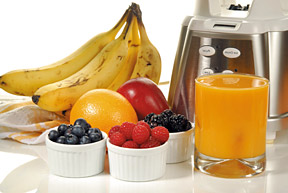Fresh Comes First
By Sara Tiner
Fresh foods may not have the shelf life of processed foods, but theoretically that's a good thing: for one, it should make you more likely to eat them before they spoil. Unfortunately, far too many people do the exact opposite, ignoring fresh foods and heaping their pantries and refrigerators with processed substitutes that often contain less nutrients, more fillers and are generally less healthy than their fresh counterparts. Here's how to make sure fresh comes first.
Wouldn't it be nice if apples lasted forever? We'd never find flies in the fruit bowl or need to dash to the store for a last-minute cheese accessory. While we're at it, wouldn't it be nice if all food lasted forever? If that were the case, we'd never find wilting lettuce tucked in the veggie drawer, or unhappy onions slowly softening in the pantry.
Everlasting food would be great,, but until that Star Trek replicator turns up in department stores, we'll have to make do. And we have managed to come up with ingenious solutions; drying, freezing, canning, sugaring, pickling, fermenting, salting, and smoking foods have historically provided a steady supply of vital nutrients in times of scarcity - as well as safeguarded us from mold and unwanted bacterial growth.
These methods are still in use, but we've outsourced the harvesting and labor involved in food preservation. What was once insurance against hunger has become a way to spend less time (and money) preparing food. Often we choose processed versions of the fresh foods we stroll right by in the produce section. And when it comes to nutrition, processed is never better than fresh.
Processed vs. Fresh Foods: What You're Missing
 Processed foods aren't necessarily devoid of nutrients, they just aren't the same as whole foods, prepared fresh. There is a difference. Take an apple versus apple juice. You get the same main benefits, but you miss out on folate, choline, betaine, vitamin A, beta carotene, lutein and zeaxanthin, vitamin E, and vitamin K, not to mention a healthy dose of fiber. And in most cases, you'll drink in more sugar with the juice.
Processed foods aren't necessarily devoid of nutrients, they just aren't the same as whole foods, prepared fresh. There is a difference. Take an apple versus apple juice. You get the same main benefits, but you miss out on folate, choline, betaine, vitamin A, beta carotene, lutein and zeaxanthin, vitamin E, and vitamin K, not to mention a healthy dose of fiber. And in most cases, you'll drink in more sugar with the juice.
(That's an example of a minimally processed food, relatively speaking. More highly processed foods common in the food supply these days can have most of their nutritional benefit stripped out. That includes commonly eaten foods such as chips, crackers, and other pre-packaged "snacks," which often use trans fats, refined grains and artificial ingredients.)
Unfortunately, too many Americans have been sold on the promise of convenience, forgetting that health is more important in the long run. Yes, frozen dinners get to your plate sooner than making it from scratch, but what do you lose in terms of nutrition by choosing processed over fresh?
The Convenience Compromise
Busy lives require convenience, but too often these shortcuts replace whole, fresh food. Over time, that can lead to unintended consequences, like weight gain and hypertension. Registered dietitian Sandy Sfikas suggests very few packaged foods to her clients, with this advice: "Using packaged foods encourage us to be lazy. It teaches us to only feed ourselves with calorie-dense and nutrient-deficient foods." And it directly impacts health.
"Sodium is a real problem in processed foods," adds Sfikas. "The only foods that are truly sodium-free are fruits, vegetables, and unsalted nuts. Even some whole wheat breads are full of sodium." Also, some people are sensitive to the chemicals used to preserve or boost taste in processed foods. Chemicals like monosodium glutamate (MSG), sulfites, and dyes (like FD&C Yellow #5) have been linked to negative reactions. So, what's a shopper to do?
Four Ways to Prioritize Fresh Over Processed
Budget for fresh food. Fresh food can be expensive, but so can car insurance or plane tickets to the family reunion. Healthy eating is as important as protecting yourself in case of an accident, or strengthening your family ties. One way to offset the cost is by checking company Web sites for coupons - many offer online coupons that add up to substantial savings.
Make shopping for fresh food as convenient as possible. In some areas, online shopping is available at individual stores or through companies like Peapod. Another option is to buy a share in a local farm, a system called community-supported agriculture (CSA). Individuals or families can buy a "share" in a local farm and receive boxes of fresh, locally grown vegetables throughout the growing season.

